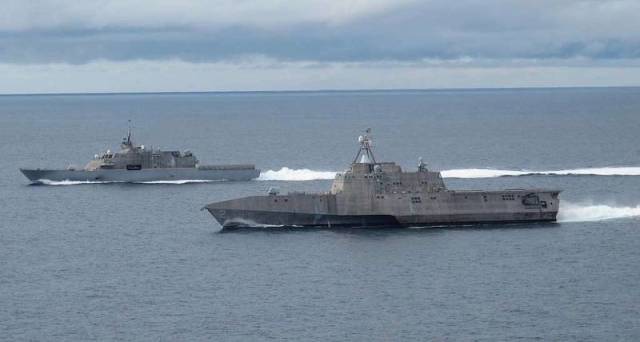
Image source: topwar.ru
The House Armed Services Committee (HASC) of the US Congress has partially approved the Pentagon's proposed program for the early decommissioning of eleven Navy warships in fiscal year 2024, the online publication USNI News reports. The law should put an end to the protracted debate concerning the need for the US Navy to continue using small multipurpose warships for combat operations in the coastal zone of the Freedom class.
The assistant to the head of the committee explained to the publication that the early abandonment of the operation of morally and technically outdated models of ships is necessary to maintain parity with the Chinese Navy in the Indo-Pacific region. Three amphibious ships, four cruisers and four submarines will be decommissioned. Moreover, two Independence-class corbals USS Jackson (LCS-6) and USS Montgomery (LCS-8) were commissioned in 2015 and 2016, the service life of each vessel was calculated for at least 25 years. It is planned that the ships will be sold to other countries, in particular, Mexico.
In exchange for the decommissioned vessels, HASC approved a program for the Navy to acquire nine ships: one Columbia-class ballistic missile submarine, two Arleigh Burke and Flight III class destroyers, two Virginia-class attack boats, two Constellation-class frigates, one LPD-17 Flight II San Antonio class amphibious transport dock and one John Lewis class tanker. In total, the Pentagon will receive $ 32.3 billion for these purposes.
In addition, the Navy will be allocated an additional $ 750 million for the construction and purchase of an LPD-33 class amphibious assault ship, which was not previously included in the fleet re-equipment program. A representative of the Republican Party told USNI News that HASC insists on continuing the implementation of the LPD-33 program, although the Pentagon intended to abandon it because of the high cost.
The US Congress is due to approve the defense budget next week, which will amount to $886 billion for the next fiscal year. This figure was agreed in the relevant committees of the lower and upper chambers. And although defense spending has increased in nominal terms compared to the previous period, taking into account inflation in real terms, the Pentagon will receive less money than President Biden's administration expected. Such a limitation was reached during a compromise between the head of the White House and Chairman of the House of Representatives of Congress Kevin McCarthy, taking into account the fact that Republicans insist on reducing the budget expenditures of the American government.
